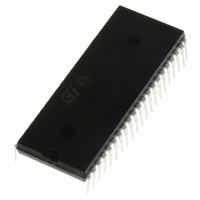ST72F324BJ6B6 STMicroelectronics, ST72F324BJ6B6 Datasheet - Page 102

ST72F324BJ6B6
Manufacturer Part Number
ST72F324BJ6B6
Description
MCU 8BIT 32KB FLASH/ROM 42-SDIP
Manufacturer
STMicroelectronics
Series
ST7r
Datasheet
1.ST72F324BJ6B6.pdf
(193 pages)
Specifications of ST72F324BJ6B6
Core Processor
ST7
Core Size
8-Bit
Speed
8MHz
Connectivity
SCI, SPI
Peripherals
LVD, POR, PWM, WDT
Number Of I /o
32
Program Memory Size
32KB (32K x 8)
Program Memory Type
FLASH
Ram Size
1K x 8
Voltage - Supply (vcc/vdd)
3.8 V ~ 5.5 V
Data Converters
A/D 12x10b
Oscillator Type
Internal
Operating Temperature
-40°C ~ 85°C
Package / Case
42-SDIP (0.600", 15.24mm)
Controller Family/series
ST7
No. Of I/o's
32
Ram Memory Size
1KB
Cpu Speed
8MHz
No. Of Timers
2
Embedded Interface Type
SCI, SPI
No. Of Pwm Channels
3
Processor Series
ST72F3x
Core
ST7
Data Bus Width
8 bit
Data Ram Size
1 KB
Interface Type
SCI, SPI
Maximum Clock Frequency
8 MHz
Number Of Programmable I/os
32
Number Of Timers
3
Maximum Operating Temperature
+ 85 C
Mounting Style
Through Hole
Development Tools By Supplier
ST7232X-EVAL, ST7MDT20-DVP3, ST7MDT20J-EMU3, STX-RLINK
Minimum Operating Temperature
- 40 C
On-chip Adc
10 bit, 12 Channel
For Use With
497-6421 - BOARD EVAL DGTL BATT CHGR DESIGN497-5046 - KIT TOOL FOR ST7/UPSD/STR7 MCU
Lead Free Status / RoHS Status
Lead free / RoHS Compliant
Eeprom Size
-
Lead Free Status / Rohs Status
Details
Other names
497-5589-5
- Current page: 102 of 193
- Download datasheet (3Mb)
On-chip peripherals
10.4.5
Note:
Note:
102/193
Error flags
Master mode fault (MODF)
Master mode fault occurs when the master device has its SS pin pulled low.
When a Master mode fault occurs:
Clearing the MODF bit is done through a software sequence:
1.
2.
To avoid any conflicts in an application with multiple slaves, the SS pin must be pulled high
during the MODF bit clearing sequence. The SPE and MSTR bits may be restored to their
original state during or after this clearing sequence.
Hardware does not allow the user to set the SPE and MSTR bits while the MODF bit is set
except in the MODF bit clearing sequence.
Overrun condition (OVR)
An overrun condition occurs, when the master device has sent a data byte and the slave
device has not cleared the SPIF bit issued from the previously transmitted byte.
When an Overrun occurs the OVR bit is set and an interrupt request is generated if the SPIE
bit is set.
In this case, the receiver buffer contains the byte sent after the SPIF bit was last cleared. A
read to the SPIDR register returns this byte. All other bytes are lost.
The OVR bit is cleared by reading the SPICSR register.
Write collision error (WCOL)
A write collision occurs when the software tries to write to the SPIDR register while a data
transfer is taking place with an external device. When this happens, the transfer continues
uninterrupted and the software write is unsuccessful.
Write collisions can occur both in master and slave mode. See also
management on page
A read collision will never occur since the received data byte is placed in a buffer in which
access is always synchronous with the MCU operation.
The WCOL bit in the SPICSR register is set if a write collision occurs.
No SPI interrupt is generated when the WCOL bit is set (the WCOL bit is a status flag only).
A software sequence clears the WCOL bit (see
–
–
–
A read access to the SPICSR register while the MODF bit is set.
A write to the SPICR register.
The MODF bit is set and an SPI interrupt request is generated if the SPIE bit is
set.
The SPE bit is reset. This blocks all output from the device and disables the SPI
peripheral.
The MSTR bit is reset, thus forcing the device into slave mode.
98.
Figure
55).
Slave select
ST72324Bxx
Related parts for ST72F324BJ6B6
Image
Part Number
Description
Manufacturer
Datasheet
Request
R

Part Number:
Description:
STMicroelectronics [RIPPLE-CARRY BINARY COUNTER/DIVIDERS]
Manufacturer:
STMicroelectronics
Datasheet:

Part Number:
Description:
STMicroelectronics [LIQUID-CRYSTAL DISPLAY DRIVERS]
Manufacturer:
STMicroelectronics
Datasheet:

Part Number:
Description:
BOARD EVAL FOR MEMS SENSORS
Manufacturer:
STMicroelectronics
Datasheet:

Part Number:
Description:
NPN TRANSISTOR POWER MODULE
Manufacturer:
STMicroelectronics
Datasheet:

Part Number:
Description:
TURBOSWITCH ULTRA-FAST HIGH VOLTAGE DIODE
Manufacturer:
STMicroelectronics
Datasheet:

Part Number:
Description:
Manufacturer:
STMicroelectronics
Datasheet:

Part Number:
Description:
DIODE / SCR MODULE
Manufacturer:
STMicroelectronics
Datasheet:

Part Number:
Description:
DIODE / SCR MODULE
Manufacturer:
STMicroelectronics
Datasheet:

Part Number:
Description:
Search -----> STE16N100
Manufacturer:
STMicroelectronics
Datasheet:

Part Number:
Description:
Search ---> STE53NA50
Manufacturer:
STMicroelectronics
Datasheet:

Part Number:
Description:
NPN Transistor Power Module
Manufacturer:
STMicroelectronics
Datasheet:










